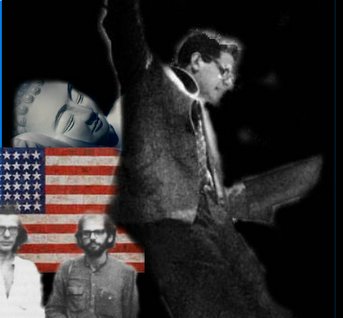Saturday, July 29, 2006
Entiat Valley fire, 1994
But like all forest fires, no one had any idea how long it would burn and how much ground it would cover when it first started. They thought what happened to them was as bad as it would get.
ANNOUNCER
A fire in the Entiat Valley that's been raging out of control since yesterday has had effects ranging from disastrous to eerie. Diane De Rooy has the story.
DIANE
At shelters in Chelan, Leavenworth and Entiat, the Red Cross gave aid to nearly 100 fire evacuees. Public information officer Courteney SOOZ-mail and dozens of volunteers work tirelessly, even though they have trouble breathing in the stinging orange smoke.
SOOZ-mail tells stories of the fire.
On Wednesday, she noticed a couple working hard at the shelter, helping others to feel safe. Later, she discovered these volunteers were fire victims who had lost everything. They had no
insurance.
The humane society is sheltering frightened housepets until the fire is over. But not all animals fare so well.
One group of ranchers braved flames to reach their cattle on the fire line and herd them to safety. But as they approached they saw to their horror that the cattle who hadn't succumbed to smoke were on fire.
SOOZ-mail says the fire is literally creating its own weather system, with high winds that feed its fury.
There's still no sign of rain in the forecast.
For Northwest Public Radio, I'm Diane De Rooy.
ANNOUNCER
The Rat Creek fire south of Leavenworth cut a clean swath east to Blewett Pass, where it blazed through a group of homes before jumping the highway. Diane De Rooy has the story.
DIANE
Firefighter Dan Dittrich had barely returned from the Tyee Mountain inferno when he saw the Rat Creek fire heading for his backyard on Blewett Pass.
Dittrich dug fire lines and felled trees around the home he's building near the junction of Highways 97 and 2.
Then he headed for his neighbors' with bulldozer and backhoe, assuring them that everything would be okay if they made a stand, once he set backfires in motion.
Following Dittrich's lead, courageous residents stood their ground. All their homes were saved.
Diane Muranke and Kurt Neubert live on the other side of Highway 97. For eight years, they've been building a home, cutting and peeling each log by hand.
They were standing in their driveway when the fire jumped the road.
As they evacuated, Muranke looked back and saw that the ridge above their home was crowning with flames. In her heart, she wrote off eight years of work.
Muranke and Neubert returned to their land on Sunday to find their home still standing.
They know it's not over. Fire crews are using their road to get back in the woods and cut fire lines.
For Northwest Public Radio, I'm Diane De Rooy.
ANNOUNCER
Twenty-five miles from the center of hell, smoke and ash from the Entiat fire pour into the giant bowl of the Wenatchee Valley. Diane De Rooy has the story.
DIANE
Simple breathing is difficult. The oxygen has gone to feed the insatiable fire.
But most people around here are prepared. An 83-year-old devotee of yard sales didn't let the smoke stop her. She appeared at sale after sale, a wet hankerchief over her nose and mouth. As soon as she took the hankie away, she exploded into hacking coughs.
Yesterday, the Red Cross put out a call for nurse volunteers. They were swamped with calls, easily filling their quotas with plenty of nurses on standby.
In Entiat, one Red Cross volunteer says she can't tell day from night. She wonders if the fire will ever end.
Officials say this is the worst fire in two decades.
For Northwest Public Radio, I'm Diane De Rooy.
ANNOUNCER
Losses from fires in the Wenatchee Valley can be counted in dollars and cents. But one mountain woman, whose home was spared, counts her loss of habitat. Diane De Rooy has the story.
DIANE
You climb up a rustic road, then descend into a natural bowl made of old and new forest and a virgin meadow. There you see Pat Rasmussen's felt-covered Mongolian yurt, miraculously still standing.
Rasmussen, a world traveler, moved to the Witch Mountain area to live close to the forest and see how the animals interact. A phone line connects her to the EcoNet, where she can communicate with the whole world with her solar-powered laptop computer.
She had come to know her neighbors--a certain squirrel, a chipmunk, a salamander--who came to visit her every day. She didn't feed her animal friends, she says, because she didn't want to interfere with their natural process.
But since the Rat Creek fire, Rasumussen's habitat has been unnaturally altered by man. Her natural meadow was bulldozed down to the dirt to create a firebreak. Caterpillar tractors have etched a couple new roads in her land.
The fire was a painful experience, she says. Her land had been pretty much untouched, pristine and beautiful.
But it's not the burned part that bothers her. She always knew a lightning strike might come. If she hadn't had neighbors, her choice would have been to let the fire sweep across her land.
It's the fact that the fire was human-caused that has filled her with conflicting feelings, she says.
She has to get used to things looking different now. She's used to the green and the healthy.
But she knows fire is part of the forest system, a phase of the forest she is willing to live with and in. She went there to learn, she says.
As she surveys her land and the damage that was done, she sees her neighbors--squirrel, chipmunk and salamander. They're still there.
And so is she.
For Northwest Public Radio, I'm Diane De Rooy.
NPR: Murder Trial (Certification hearing)
Following six days of impassioned testimony to determine whether two 12-year-olds, charged with first-degree murder, should be tried as adults, Chelan County Superior Court Judge John Bridges made his decision. Diane De Rooy reports.
DIANE
For a week Judge Bridges was faced by two children, seated and shackled at the ankles, so small that their feet barely touched the floor of the courtroom.
The boys, John Duncan and Manuel Sanchez, told police they shot and killed farmworker Emilio Pruneda last summer.
Because the murder was brutal the state asked the court to try the boys as adults, allowing a minimum sentencing of 20 years in an adult corrections facility if convicted.
Bridges said the crime was probably the most serious he had ever seen come before his bench.
But he also determined both children came from extremely dysfunctional homes. They had not developed values that consider the rights of others, but only of their own survival.
Bridges said he doesn’t consider the boys to be victims. He said there were only two victims in this crime: Emilio Pruneda and the people of Wenatchee, who he says are not sure now that they can see a 12-year-old coming at them without wondering if he is armed.
Giving weight to the probability of rehabilitation Bridges ruled to retain boys in the juvenile court. Duncan and Sanchez will be arraigned tomorrow.
For Northwest Public Radio, I’m Diane De Rooy.
NPR: Murder Trial (arraignment)
In the decision not to try two Wenatchee 12-year-olds, charged with first—degree murder, as adults, the issue was rehabilitation versus retribution. Diane De Rooy reports.
DIANE
Last summer’s murder of farmworker Emilio Pruneda forced a hearing to decide if the juveniles should stand trial as adults. John Duncan and Manuel Sanchez are accused of shooting Pruneda to death, after hunting him down and surrounding him on the west bank of the Columbia River.
If the children had been tried as adults, they could have been sentenced to at least 20 years in adult correctional facilities. Teachers, therapists and juvenile justice workers pleaded for rehabilitation of the boys, rather than warehousing them in adult facilities.
Penny Hoiland, of Chelan County Juvenile, said simple incarceration would guarantee these children would never be rehabilitated.
Hoiland testified that the juvenile justice system would teach values, anger management and social skills, in addition to providing regular education and vocational training. Hoiland wants to see Duncan and Sanchez have a last chance to be children within the structure of the juvenile system.
She’s philosophical about the murder. She says Emilio Pruneda died to save these two children.
For Northwest Public Radio, I’m Diane De Rooy.
Thursday, July 27, 2006
NPR: Omak Stampede Suicide Race
40,000 spectators witnessed he 59th annual running of the Omak Stampede’s controversial suicide race. Diane De Rooy has the story.
DIANE
Twenty horses and riders charged over the edge of a bluff to plunge 250 feet down into the Okanogan River in a no-holds-barred contest considered barbaric by animal rights activists.
Cactus Jack Miller, with the Omak Stampede Association, calls the 1994 suicide runs “phenomenal.” He says most animal rights groups are misled as to how harmful this race is to horses.
No horses were killed but deaths of the past have brought PAWS'—the Progressive Animal Welfare Society’s—scrutiny to the race. Nine horses have been killed in the last 12 years.
PAWS didn’t hold a protest this year. It did attempt to stop the race by saying the horses block the river when crossing, violating a federal waterways law.
PAWS spokesman, Will Anderson, observed all four runs over the weekend. As riders come down the steep face of the bluff, they try to get in their opponents’ way, often causing massive pile-ups of horses and trampling of riders. Fights between riders are common, and participants are frequently taken away in ambulances.
Anderson says the audience is paying a $2 entry fee for the endangerment of human life and killing horses.
Miller defends the violence of the event, explaining that the same level of aggression exists in all sports. He likes to say it’s like sex; it’s wild and exciting and it’s over soon, and when you’re done all you want is more.
Anderson agrees the testosterone is out there, but it’s channeled into destruction and death. In a promotional video made for the suicide race, he cites 16 verbal allusions to pain and death, as well as 19 visual images of falling horses and injured riders.
While the Omak Stampede has the blessing of the National Rodeo Association, the suicide race is not sanctioned.
Anderson predicts several more horse deaths in future suicide races and says a human fatality is inevitable.
For Northwest Public Radio, I’m Diane De Rooy.
Wednesday, July 26, 2006
NPR: Billboards on Highway 2
ANNOUNCER
Following more than a year of developing a sign ordinance to control billboards in Wenatchee, an outdoor sign company is asking Chelan County to allow billboards along the Stevens Pass Highway. Diane De Rooy reports.
DIANE
The Obie Outdoor Advertising Company of Medford, Oregon has asked Chelan County’s Planning Commission to allow billboards along State Highway 2
Wenatchee resident Jim Snyder, who led the movement to revise the city’s sign ordinance, says the permits should be denied. He says the proposed billboards violate the spirit of the 30-year-old Scenic Vistas Act. At the time it was written, he says, the act was not comprehensive enough to incorporate the scenic rural highways of Washington State
The county planning department has recommended approval of one of Obie’s requested sites. It is directly on a Colville Indian burial ground near the city of Cashmere. If the permit is granted, Obie will have to obtain a letter from the Colvilles approving the billboard’s placement
The Chelan County Board of Adjustment will consider the request during its meeting tonight
For Northwest Public Radio, I’m Diane De Rooy
Tuesday, July 25, 2006
NPR: Skateboarders vs. downtown merchants
ANNOUNCER
The city of Wenatchee banned skateboarding downtown last year. Now taking a cue from cities like Moses Lake and Yakima, a park board member is determined to build a skate park for the displaced teen skaters. Diane De Rooy has the story.
DIANE
Wenatchee Park Board member Gene Anderson has formed a committee to research skate park funding and locations.
Skaters were banned after downtown merchants complained of extensive property damage and one businessman was run down by a skater.
After considerable debate, the city gave skaters some old tennis courts, saying the kids would have to make repairs and renovations at their own expense.
Skaters held car washes and bake sales, but only managed to raise $5,000 of the $25,000 they needed.
That was a year ago.
Anderson says adults have no credibility with youth if they don’t even attempt to make something happen. Inspired by the fact that the skaters raised $5,000 with no support, he has pledged to meet with his committee twice a week, if necessary, so he can approach the city commission with a complete skate park proposal.
For Northwest Public Radio, I’m Diane De Rooy.
Announcer
The Wenatchee Park Board skate park group will meet for the first time Wednesday at 5:30 p.m.
Monday, July 24, 2006
NPR: 12th District representation
ANNOUNCER
George Sellars, Dale Foreman and Clyde Ballard, all representing the 12th District, will lead the Republicans in the next session. Diane De Rooy tells us who these lawmakers are
DIANE
Six-term Senator George Sellars of East Wenatchee is highly regarded by Democrats and Republicans alike. The current minority leader of the senate is characterized as sincere, cooperative and fair.
Representative Dale Foreman of Wenatchee is also admired in his district. Foreman, a fiscal conservative, is able to take a moderate stance on people issues such as health care reform and taxes. A Harvard—educated lawyer, he is a steadfast defender of the constitution, as well as the healthy separation of church and state.
Only Clyde Ballard of East Wenatchee, the heir-apparent house speaker, draws criticism from both parties in his district. Friend and foe alike characterize his style as deliberately uncooperative. Opponents point out that Ballard took money from real estate lobbyists and then voted against the Growth Management Act.
Ballard says he accepts donations from people, but that he always votes the way he thinks is right, even if that means he shoots down the hopes of the lobbies that support him.
For Northwest Public Radio, I’m Diane De Rooy.
Sunday, July 23, 2006
NPR: 12th District Caucus
State Republicans are meeting in caucus Friday in Yakima to determine leadership in the house and senate. As Diane De Rooy reports, the front-runners in Republican leadership all happen to be from central Washington.
DIANE
Representative Clyde Ballard of East Wenatchee will be the new speaker of the house. Wenatchee representative Dale Foreman will assume the position of house majority leader. And state senator George Sellars of East Wenatchee hopes to stay on as minority leader. But he’s being challenged by Bellevue’s Dan McDonald. The race is said to be a tight one.
12th District constituents, no matter what their party affiliation, are eager to see what this leadership slate will mean for central Washington.
According to Sellars and Foreman, health care will be high on their agendas, followed by tax reform issues that affect property owners and businesspeople.
Ballard believes government should only do for people what people cannot do for themselves. That’s why he opposed the Growth Management Act and will fight to revise it in his seventh term in the house.
All three legislators agree that the 12th District’s needs have been overlooked by the western Washington democrats who once dominated the state legislature.
For Northwest Public Radio, I’m Diane De Rooy.






